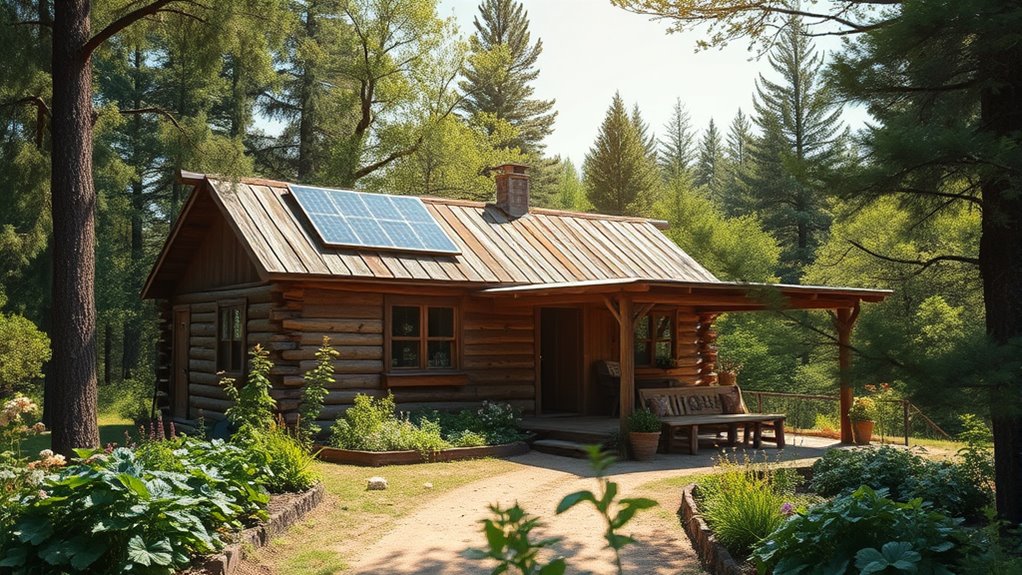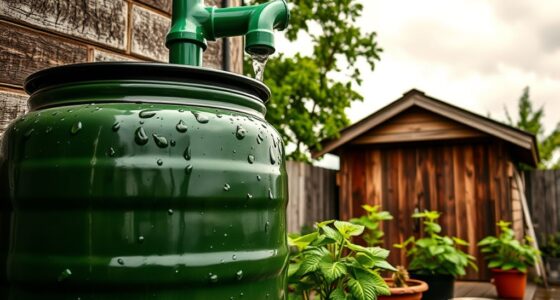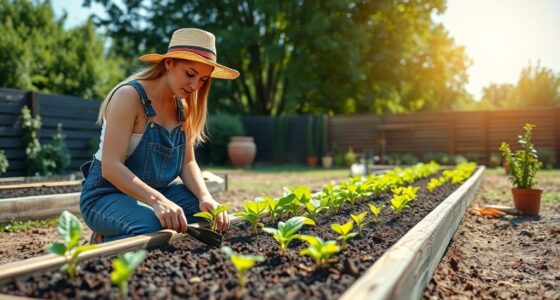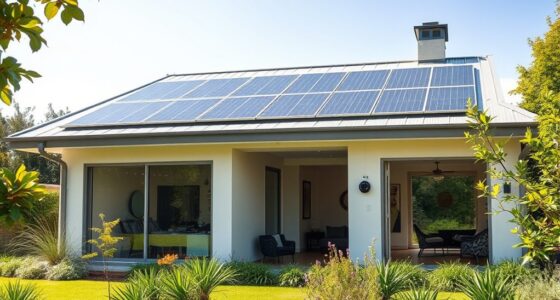Living off-grid can be rewarding if you value independence and sustainability, but it requires managing your energy and water needs carefully. You’ll need to install solar panels, store excess power, and develop water conservation habits through rainwater harvesting or well use. It’s a lifestyle that promotes eco-friendliness, cost savings, and self-reliance, but demands a good understanding of your resources and habits. Curious about how to make it work for you? Keep exploring to find out more.
Key Takeaways
- Assess your willingness to manage renewable energy and water systems independently.
- Consider your ability to handle maintenance, repairs, and resource conservation efforts.
- Evaluate if you prefer a sustainable, eco-friendly lifestyle away from urban utilities.
- Understand the initial setup costs and ongoing responsibilities involved in off-grid living.
- Reflect on your commitment to adapting daily habits for water and energy conservation.
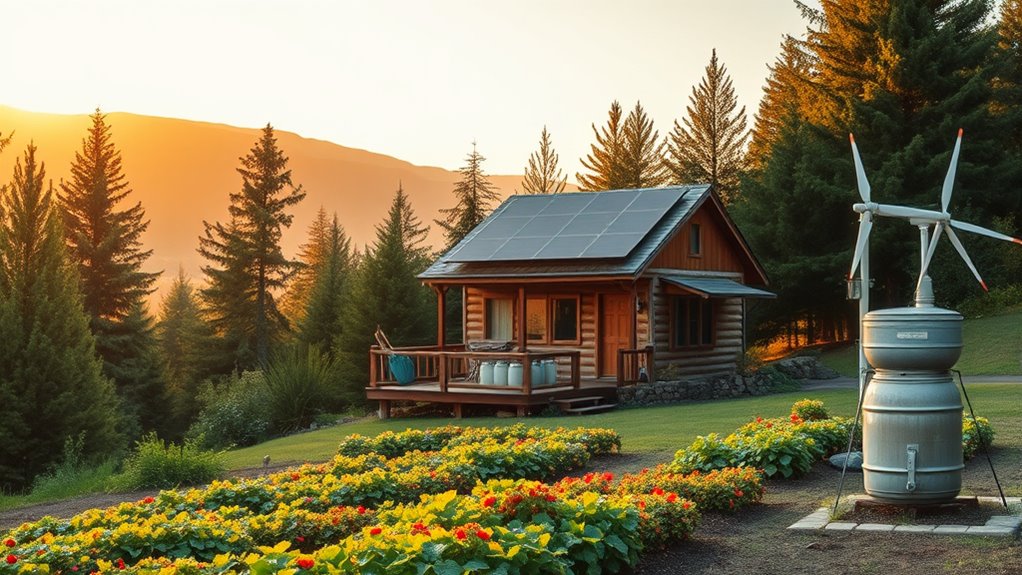
Have you ever wondered what it’s like to live completely off the grid? If so, you’re probably curious about how you’d generate your own power and manage your water. Living off-grid means stepping away from traditional utilities and taking control of your energy and water needs. Solar power becomes an essential part of this lifestyle, offering a sustainable and reliable energy source. With solar panels, you can harness the sun’s rays to produce electricity for your home, appliances, and even charging your devices. It’s a clean, renewable option that reduces your reliance on fossil fuels and helps keep your carbon footprint minimal.
But adopting solar power isn’t just about installing panels; it’s about understanding your energy consumption and optimizing your setup. You’ll need to consider the size of your solar array based on your daily energy needs, as well as investing in batteries for storing excess power for cloudy days or nighttime. Proper maintenance and periodic checks ensure your system runs efficiently, giving you peace of mind that your home stays powered year-round. Over time, many find that solar power pays for itself through savings on utility bills and grants peace of mind knowing you’re not dependent on distant power grids. Incorporating a renewable energy mindset can further enhance the sustainability of your off-grid setup.
Water conservation becomes equally essential when living off-grid. Unlike urban areas with readily available water supplies, off-grid living demands careful management of your water resources. You’ll likely rely on a well or rainwater harvesting system, making water conservation indispensable to ensure your supply lasts. Simple habits like fixing leaks immediately, using low-flow fixtures, and collecting rainwater can considerably reduce your water usage. You might also consider composting toilets or greywater systems to recycle water for irrigation, further reducing your overall consumption. Additionally, understanding water quality testing can help ensure your water remains safe and free from contaminants, which is crucial in off-grid settings.
Managing water efficiently requires a mindset shift, but the benefits are worth it. Not only do you extend your water supply, but you also minimize waste and environmental impact. During dry seasons or periods of low rainfall, being diligent about water conservation becomes even more critical. It’s about knowing your water source, understanding how much you use daily, and implementing strategies to maximize its use. Additionally, understanding spoiled lemon juice signs can help you avoid waste and ensure your supplies stay fresh and safe. This lifestyle rewards you with independence and a closer connection to your environment.
Frequently Asked Questions
What Are the Initial Costs of Starting Off-Grid Living?
Your initial investment for off-grid living varies, but a clear cost breakdown helps. Expect to spend on solar panels, batteries, and backup systems for power, along with water collection and storage solutions. You’ll also need land, shelter, and possibly tools or equipment. Overall, costs can range from a few thousand to tens of thousands of dollars, depending on your setup’s scale and self-sufficiency level. Proper planning guarantees you’re prepared financially.
How Do Off-Grid Homes Handle Emergencies and Medical Needs?
In off-grid homes, emergency preparedness and medical access are essential. You should keep a well-stocked first aid kit, learn basic medical skills, and have a communication plan for emergencies. Installing solar-powered communication devices or satellite phones ensures you stay connected for medical needs or emergencies. Regularly reviewing safety procedures and maintaining emergency supplies help you respond quickly and effectively, giving you peace of mind in any situation.
What Legal Restrictions Exist for Off-Grid Properties?
Think of legal restrictions as the invisible fences shaping your dreams. Zoning regulations and property rights act like guardians that can limit or protect your land’s use. Before you plunge in, check local laws—some areas restrict certain off-grid setups or require permits. Knowing these rules helps you navigate the landscape safely, ensuring your self-sufficient lifestyle stays within legal boundaries and keeps your independence intact.
How Do Off-Grid Systems Impact Property Resale Value?
You might find that off-grid systems can impact property appreciation and market demand. While some buyers seek eco-friendly, self-sufficient homes, others may be deterred by limited utilities or zoning restrictions. These factors can influence resale value, making your property less appealing to mainstream buyers. To maximize market demand, consider integrating off-grid systems thoughtfully, highlighting cost savings and sustainability benefits, and understanding local regulations that could affect resale potential.
Can Off-Grid Living Be Sustainable in Urban Environments?
While urban sustainability seems challenging, city off-grid living can work if you embrace innovative solutions. You can harness rooftop solar panels, rainwater harvesting, and urban gardening to reduce reliance on traditional utilities. Though it’s not entirely off-grid, integrating these practices allows you to live more sustainably within the city. You create a balance between urban convenience and eco-friendly independence, making city off-grid a feasible option for eco-conscious city dwellers.
Conclusion
Deciding to go off-grid is like planting a seed that can grow into a thriving, self-sufficient life. It’s not for everyone, but if you’re enthusiastic to embrace independence and live closer to nature, it could be your perfect path. Just remember, it’s a journey of dedication and adaptability. If you’re ready to weather the storms and bask in the sunshine of self-reliance, then maybe this lifestyle is your true north.
